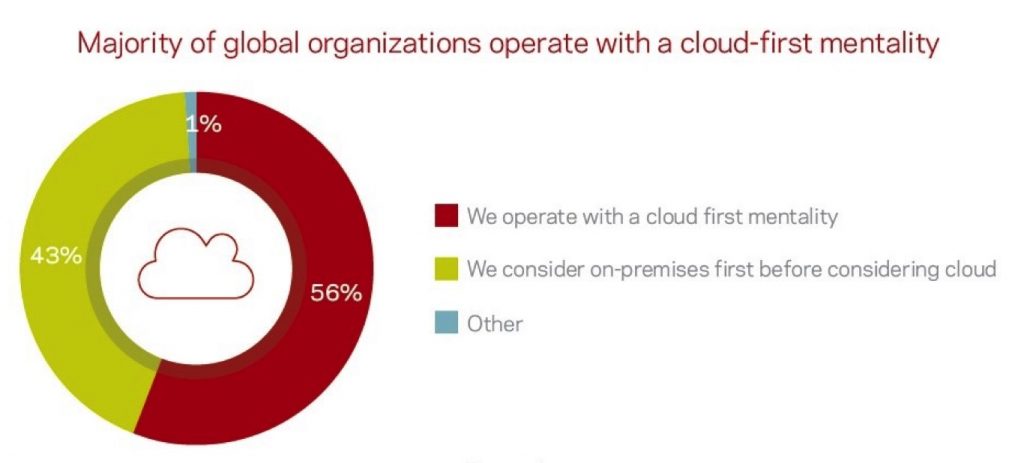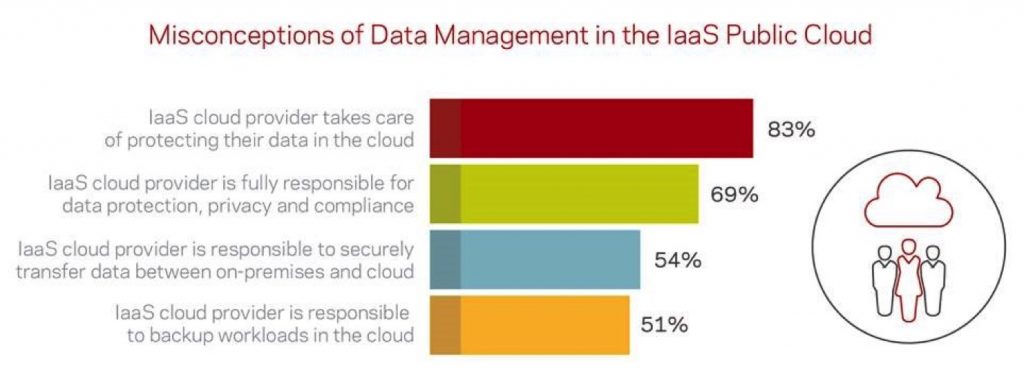69% of Organizations Export Full Responsibility for Data Protection, Privacy and Compliance Onto Cloud Service Providers
Vanson Bourne survey commissioned by Veritas
This is a Press Release edited by StorageNewsletter.com on November 2, 2017 at 2:30 pmVeritas Technologies LLC announced the results of a global survey spanning thirteen countries indicating that the majority of global organizations (56%) operate with a cloud-first mentality when it comes to deploying new applications and managing workloads.
Only 1% of organizations reported that they will not be adopting cloud over the next two years. However, the study reveals that significant misconceptions exist on the responsibility for data management, with 69% of organizations wrongfully believing data protection, data privacy and compliance are the responsibility of the cloud service provider.
How organizations are deploying new applications and workloads?
Showing the results of 1,200 respondents

The Truth in Cloud study, commissioned by Veritas and conducted by Vanson Bourne, surveyed 1,200 global business and IT decision makers revealed that customers are embracing the multi-cloud as a key component of their business strategies. Within the survey, customers indicated they use a variety of cloud service providers, including public clouds and hosted private clouds. With respect to Infrastructure as a Service (IaaS) specifically, over two-thirds (67%) of organizations state they use, or plan to use, two or more cloud providers. 42% say they are using, or plan to use, three or more cloud providers, with common goals of improving resiliency and data security as well as reducing Capex and Opex.
As customers embrace the cloud, the research explores three key areas of focus: misconceptions of data management in the public cloud, rise in multi-cloud adoption and future cloud trends.
Misconceptions of Data Management in Public Cloud
Although organizations are adopting a multi-cloud approach, the research shows that when it comes to public clouds specifically, there are likely misconceptions around which party holds the ultimate responsibility for data management: the customer or the cloud provider.
Key findings include:
- More than eight in ten (83%) of organizations that use or plan to use IaaS believe that their cloud service provider takes care of protecting their data in the cloud.
- More than two-thirds (69%) of respondents believe they can place all responsibility for data protection, data privacy and compliance on cloud service providers.
- Over half (54%) of organizations believe it is the responsibility of the cloud service provider to securely transfer data between on-premises and cloud.
- Over half (51%) believe it is the responsibility of the cloud service provider to backup workloads in the cloud.
- More than one in two (55% ) of organizations also believe that application uptime is the responsibility of the cloud provider.
When it comes to public clouds specifically,
there are likely misconceptions around which party
hold the ultimate reponsability for data management:
the customer and the cloud provider
Showing the results of 1,200 respondents, multiple answers were possible

“Our legal teams reviewed contracts from multiple public cloud service providers to help Veritas understand what customers and cloud service providers are responsible for with respect to data management in the public cloud,” said Mike Palmer, EVP and chief product officer, Veritas.
“Despite customers’ belief that cloud providers hold the responsibility of data management, cloud service provider contracts usually place data management responsibility on customers. Our research backed up our assumptions that the primary responsibility for data management lies with the customer,” Palmer added. “Veritas fully embraces a multi-cloud approach and is partnering with many leading cloud service providers to help customers manage and extract maximum value from their applications and data.”
Rise in Multi-Cloud Adoption
The research also shows that on average, organizations are using, or plan to use, multiple cloud platforms, ranging from public clouds to hosted private clouds. However, many organizations continue to face challenges getting to the cloud regardless of whether it is a public cloud or a hosted private cloud.
The common barriers are:
- Complexity with cloud migration (37%).
- Legacy technology limitations (36%).
- Lack of in-house skills (38%).
- Lack of a clear strategy (32%).
- Data silos (27%).
Currently, 75% of organizations work with an IaaS public cloud provider and surprisingly, 16% of respondents say that they use, or plan to use, five or more cloud providers. Respondents stated that data privacy, security and compliance, workload performance and uptime are the top deciding factors impacting cloud provider selection.
Future Cloud Trends
According to the study, IT spending on cloud technologies, including public cloud providers, is expected to rise from 12% in 2017 to 18% within the next two years. The trend is likely to continue and increase, as more than half (58%) of organizations that currently use one cloud provider indicate they plan to expand their portfolio across multiple cloud platforms.
“As more companies embrace a cloud-first mentality, the need to navigate the complexities of a multi-cloud world is critical. As with on-premises environments, customers should consider all aspects of data management as they journey to the cloud, from data protection, compliance readiness, and workload portability to BC and storage optimization,” added Palmer.













 Subscribe to our free daily newsletter
Subscribe to our free daily newsletter

